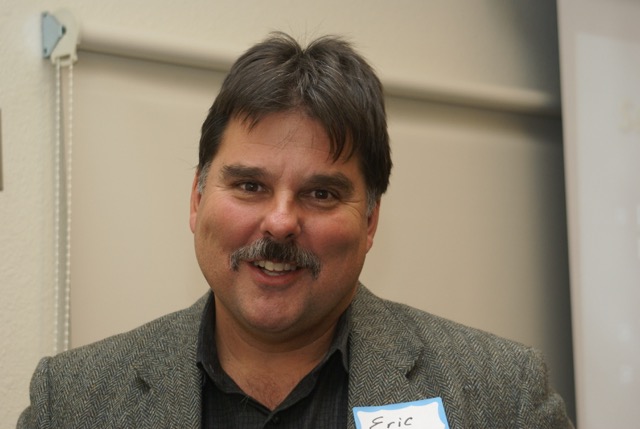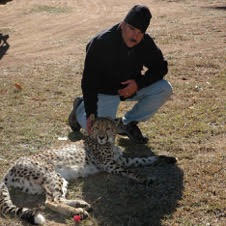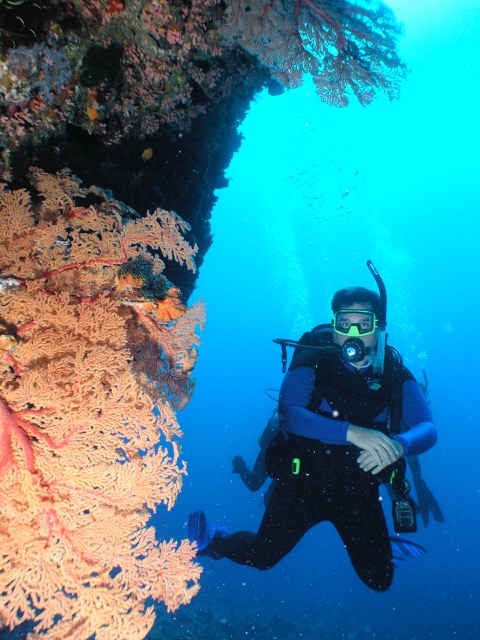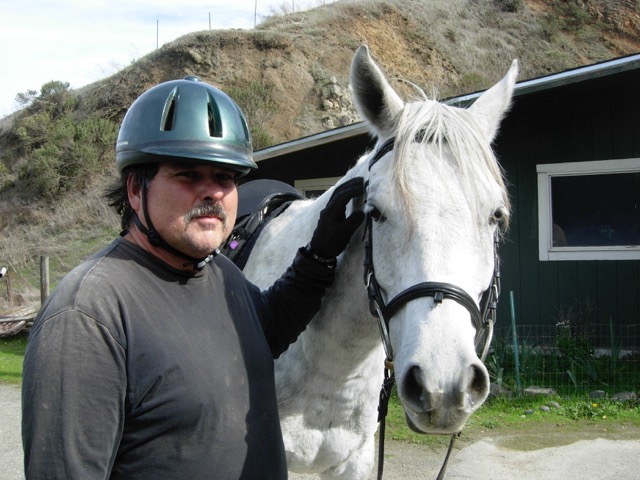UC-AFT Member Spotlight--Eric Schroeder: Davis Writing Lecturer, Study Abroad Director and Nash Prize Recipient

Eric Schroeder retired last year after teaching for 30 years in the University Writing Program and other departments at UC Davis. As Faculty Director of Study Abroad, Eric enriched the program by expanding offerings beyond Europe and into the sciences. Eric is the 2015 recipient of the Nash Prize, which recognizes commitment to shared governance and faculty welfare. His long career and deep experience working within campus governance structures at UC Davis provides a unique insight for UC-AFT members as we continue to struggle for stable appointments and access to departmental and campus decision making.
Insider: You've recently retired from a 30-year career as a writing lecturer and study abroad director at UC Davis. Congratulations!
E.S.: Thank you. Looking back on it, it seems like a long time!
Insider: It's possible to have a 30-year career as a lecturer at UC now, but it wasn't when you started. Did you think it would turn out this way when you began lecturing at Davis?
E.S.: Not at all. I finished my PhD at UCLA in 1984 and was hired as a visiting lecturer by the Composition Program at UC Davis a few months before I filed my dissertation. I went to Davis on a one-year contract, thinking I’d be there two or three years at most. I thought this for a couple of reasons. First, having just earned a PhD in English Lit from UCLA, I had been conditioned to think that any other appointment than a senate position teaching English literature would be failure on my part and, second, I quickly became aware that the University of California had a “6 years and out” rule in effect—you could only work as a lecturer for six years and then you would be let go. That was a primary reason for me becoming involved with the debate on campus surrounding the movement to unionize.
Insider: You are the 2015 recipient of the Nash Prize, which is jointly awarded by the Academic Senate, the Academic Federation and the Faculty Association at Davis. How does it feel to have your contributions to the Davis community recognized in this way?
E.S.: It’s very gratifying. I was fortunate at the start of my teaching career to have an appointment that split my time evenly between the English Department (for whom I taught freshman and advanced composition courses) and what was then called the Campus Writing Center. At Davis, the CWC was the interdisciplinary writing program—we worked to design writing classes for students studying in various academic disciplines. For instance, in my first three years at Davis, I taught writing courses paired with eight different departments—history, genetics, psychology, computer science, engineering, political science, philosophy, and African-American studies. This put me in close contact with professors in all sorts of departments—it was a wonderful introduction to UC Davis and I remained close to a few of those people for my whole career at UCD. So I think I was luckier than many people in meeting academics across campus—particularly professors in the sciences.
Insider: The Nash Prize recognizes contributions to shared governance and advocacy for faculty interests and welfare. You're the second non-senate academic to receive the award. Are there challenges for non-senate academics in terms of being accepted and recognized for their work on faculty issues?
E.S.: Well, some might argue I’m the first non-senate member to win this award since Catherine VandeVoort had already joined the ranks of the Senate when she won the award. But, yes, even though we’ve come a long way since those pre-contract days, the climb can still seem vertical at times. For instance, I’ve served on a lot of committees at UCD, including a number of senate committees. Technically, non-senate members do not have a vote on these committees. I always raise this question when I’m newly appointed to a committee. Most committee chairs I have worked with, recognizing my work ethic, have assured me that I’ll have a vote on that particular committee. But then one often encounters blind ignorance, too. Recently at UCD, the head of a very powerful Senate committee constantly disparaged lecturers and other non-senate academics during committee meetings. He was so intransigent in his beliefs that my colleague who was serving on the committee declined to serve a second year. So there will always be challenges for non-senate academics at UC.
Insider: In the current Unit 18 negotiations, UC-AFT is to trying to stabilize pre-continuing appointments and improve access to departmental and campus governance. Do you think these changes could open doors for more lecturers to contribute in the way that you have at Davis?
E.S.: I would certainly hope so. I do worry that new lecturers don’t appreciate the history of UC-AFT and the University of California. Certainly in 1984 almost all of us working as lecturers at UC Davis didn’t see this as a career but rather as a paycheck. It was only when we won our first contract that we started to think, “Hey, I’m not necessarily going to have to pack my bags after six years." At that time, none of us knew what it would be like going through “the eye of the needle," as the review process was referred to back then, but we had hopes that some of us would succeed. As it turned out, most of us did. The realization that we now had the possibility to stay on if we chose to inspired a number of us to begin to treat these positions as careers. That period—the late 80’s and early 90’s was a very exciting time for composition studies as a discipline and for our program at UC Davis in particular. I had many wonderful colleagues doing exciting things in their classrooms and in their research (even though, as we were all constantly reminded by the administration, lecturers didn’t have a research obligation; their only job requirement was teaching.) UC Davis has ended up having one of the top ranked writing programs in the country and that reputation was built mostly by its lecturers—I hope the current generation maintains that legacy.
 Insider: Tell us about your work with Study Abroad. What was most rewarding for you in your work there?
Insider: Tell us about your work with Study Abroad. What was most rewarding for you in your work there?
E.S.: It took me a couple of years to feel comfortable in my role as Study Abroad Director despite the fact that I had been teaching in the program for sixteen years already. That’s because Study Abroad has become such a complex field and it took me a while to figure out that a lot of what we were doing wasn’t measuring up to best standards in the field. Once I had a reasonable grasp on the requirements of the job, I realized that the issue I was most passionate about was access to Study Abroad. Access is a huge issue in this field. When people talk about it, they generally talk about the fact that for students of color and those from poorer backgrounds, Study Abroad is often a dream rather than a reality. So one of my priorities was working to create more access to our programs though grants. But another was even more basic—working to dispel myths about Study Abroad (one of the most persistent is that Study Abroad is just for the honors students and the rich ones). We’ve done a pretty good job on this front over the years—the last time we looked at the figures the percentage of Study Abroad students receiving financial aid mirrors that of all students at the university. But the other way in which I worked to increase access is a less recognized one. When I became director, most of our programs went to Europe and most of them focused on the arts and humanities (we deliberately have chosen not to offer language-based programs since our summer programs are only a month in length.) I worked very hard to recruit faculty from the sciences and faculty who wanted to teach in non-European countries.  So now, for instance, Summer Abroad offers a microbiology lab in Thailand, a course on seismic engineering in Japan, a course on food studies in China, and a whole range of programs in Latin America. I’m really proud of the range of our offerings—we really have tried to develop a program for every undergrad at UCD.
So now, for instance, Summer Abroad offers a microbiology lab in Thailand, a course on seismic engineering in Japan, a course on food studies in China, and a whole range of programs in Latin America. I’m really proud of the range of our offerings—we really have tried to develop a program for every undergrad at UCD.
Insider: How would you describe the value of the union to a lecturer in their first year?
E.S.: Huge. It’s important for first-year lecturers to learn how the campus works, and what expectations the campus and one’s department have for lecturers. The union and fellow union members can help with this. Because of the fact that almost all first-year lecturers are on a one-year contract (the campus has the power to hire for two years but almost never chooses to do this with pre-six lecturers), it’s imperative that they learn quickly what’s expected of them. Yes, the standards for being rehired in your first six years are less stringent than the standard for receiving a Continuing Lecturer appointment, but you really have to have that major review in mind from the start if you think there’s a chance that you want to make this job a career. Being mentored by a Continuing Lecturer who has that experience already would be a great asset for a new employee.
Insider: How does it feel to be retired? What are you looking forward to spending time doing?
 E.S.: My wife’s joke is that I’ve handled retirement by working and by traveling—it’s true that right after I retired last summer I was bought back at 20% to help with the transition to a new faculty director, and I also taught a new experimental Study Abroad program that took place in London over the Christmas break. But I’ve been completely retired since January 1 (although I will be leading my 20th Summer Abroad program in South Africa this July). My original plan was to be riding my horse 4 days a week but he had a debilitating injury and had to be retired prematurely (I think he heard I was retiring and wondered why he couldn’t do so, too!) I’ve recently bought a new horse—a six-year-old Arabian trail horse—and hope to start riding him soon!
E.S.: My wife’s joke is that I’ve handled retirement by working and by traveling—it’s true that right after I retired last summer I was bought back at 20% to help with the transition to a new faculty director, and I also taught a new experimental Study Abroad program that took place in London over the Christmas break. But I’ve been completely retired since January 1 (although I will be leading my 20th Summer Abroad program in South Africa this July). My original plan was to be riding my horse 4 days a week but he had a debilitating injury and had to be retired prematurely (I think he heard I was retiring and wondered why he couldn’t do so, too!) I’ve recently bought a new horse—a six-year-old Arabian trail horse—and hope to start riding him soon!
-

- Log in to post comments

